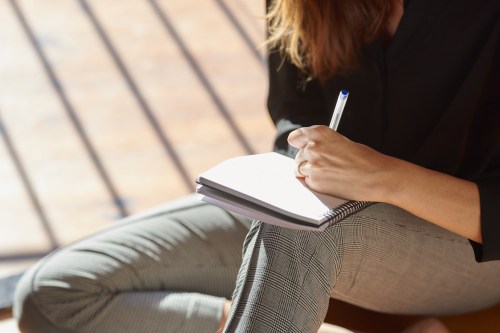Our editors independently select these products. Making a purchase through our links may earn Well+Good a commission
How To Write a Meaningful Thank-You Note Without Getting Too Corny
Etiquette expert Diane Gottsman explains how to write a proper thank-you note with grace and ease, even if you're not a writer.

Technology has made communication easier than ever, but that doesn’t necessarily mean there’s been an overall improvement in correspondence. The quantity of communications has, in other words, certainly replaced quality in many cases. But there remains something to be said for slowing down long enough to put pen to paper when there’s meaningful occasion, expressions of gratitude offer just such an occasion, according to Diane Gottsman, etiquette expert, author of Modern Etiquette for a Better Life, and founder of The Protocol School of Texas. There is very much still a place in the world, she says, for the handwritten thank-you note.
Experts in This Article
etiquette expert and founder of the Protocol School of Texas
“Saying ‘thank you’ is nice, but a handwritten note takes the gesture a step further,” she says. “When someone takes the time to pull out a pen and paper, write their thoughts down, and make the effort to put it in the mail, the message is clearly ‘I appreciate you.'”
Even as a writer, however, I struggle with this type of writing. Anything you can say, in my opinion, feels trite and empty. Fortunately, Gottsman says there’s no need to overthink things. To author an authentic letter with relative ease, she suggests writing as you would speak to the letter’s recipient. In other words, there’s no reason to use flowery language or sound more formal than you normally would just because you’re putting pen to paper. If you’re struggling to find your flow, she suggests speaking the words out loud first, and then transcribing them.
Your note doesn’t need to be lengthy, either. In fact, she says, four to five sentences is ideal: one should mention the act or gift for which you are thankful; one or two should express what the gesture means to you; and then you can wrap things up by reinstating your gratitude. “To conclude your note, say something like, ‘I look forward to seeing you soon,’ and don’t forget to let the person know how you plan to use the gift,” says Gottsman. “Or, make sure and mention how the favor or effort improved you situation.”
Even if your handwriting is not so great, Gottsman says it’s better to try to make things as legible as possible versus typing something up, as the gesture will seem more sincere when done in your own imperfect hand. Of course, you can email a thank-you note if the act for which you are thankful is small, such as an invitation to lunch or a minor favor, Gottsman explains. “But the effort should mirror the time it took and the thought put into the thing for which you’re expressing gratitude,” she says.
And because it’s easy to let technically non-essential tasks like thank-you notes go forgotten, Gottsman advises being prepared at all times to jot off a note immediately upon receiving a gift or favor—keep everything you’ll need on hand, including stationary or note cards, envelopes, and stamps.
Gottsman recommends thinking outside of the box when it comes to when you write a thank-you note. There are certain occasions on which they are expected—when, for example, you’ve been sent a wedding gift—but there are other, less predictable times to send them at which they can have an even greater impact. You could, for example, send an unprovoked thank-you note to a mentor of yours, says Gottsman. And while a “regular” thank-you note is generally timely—you want to send it within a few weeks of having received whatever it is you’re expressing gratitude for—there’s no time limit on other types of thank-you’s. If you’ve suddenly realized how much you appreciated a friend being there for you through a difficult time or some small thing someone did for you once, it never hurts to express those feelings to them—even years later.
It’s worth noting that sending such a missive is not a wholly unselfish act, either. Gottsman says that while receiving a thank-you note is certain to brighten anyone’s day, you reap benefits as a sender, too. Thank-you notes can, after all, help to build or strengthen relationships, and relationships are a critical component of human health.
And perhaps your note can live on beyond the short shelf life of a digital “thank you,” even if it’s not poetic. Sure, it might not be quoted by strangers centuries after you’ve written it, but it may be remembered, and even kept, by its recipient for years to come.
Oh hi! You look like someone who loves free workouts, discounts for cult-fave wellness brands, and exclusive Well+Good content. Sign up for Well+, our online community of wellness insiders, and unlock your rewards instantly.
Sign Up for Our Daily Newsletter
Get all the latest in wellness, trends, food, fitness, beauty, and more delivered right to your inbox.
Got it, you've been added to our email list.










